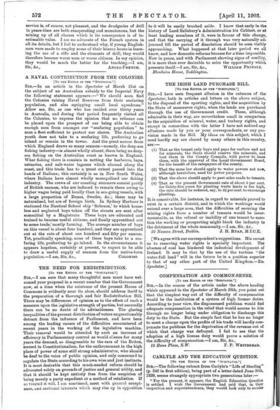THE IRISH LAND PURCHASE BILL.
[To THE EDITOR OP THE "SPECTATOR"] SIE,—I have seen frequent allusion in the columns of the
Spectator, both in articles and letters on the above subject, to the disposal of the sporting rights, and the acquisition by the State of manceuvre rights, when the lands are purchased through the use of Government credit. These, although admirable in their way, are nevertheless small in comparison to the acquisition of mineral, water, and turbary rights, and except in connection with the latter I have not noticed any allusions made by you or your correspondents, or any pro- vision made in the Bill. My ideas on this subject, which I need hardly say are shared by many others in this country, are :-
(1) That as the tenant only buys and pays for surface and not for minerals, the State should reserve the minerals, and vest them in the County Councils, with power to lease them, with the approval of the Local Government Board, for the benefit of the ratepayers. of the county.
(2) That the same law should apply to water powers not now, although heretofore, used for power purposes.
(3) That the above should apply to past sales made to tenants.
(4) That as the present Government rate of about 5 per cent. for thirty-five years for planting waste lands is too high, the rate should be reduced, say, to 24- per cent, to encourage planting.
It is conceivable, for instance, in regard to minerals proved to exist in a certain district, and in which the workings would extend over a large area, that the difficulties of securing the mining rights from a number of tenants would be insur- mountable, as the refusal or inability of -one tenant to sanc- tion the working or prospecting might block the industry to the detriment of the whole community.—I am, Sir, &c.,
[We agree with our correspondent's suggestions. His caveat as to reserving water rights is specially important. The absence of coal has hindered the industrial development of Ireland. It may be that by the use of the turbine "the water.full land" will in the future be in a position superior to that of any other part of the United Kingdom.—En. Spectator.].






































 Previous page
Previous page